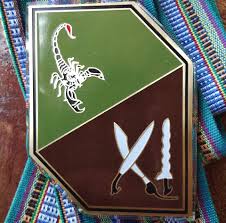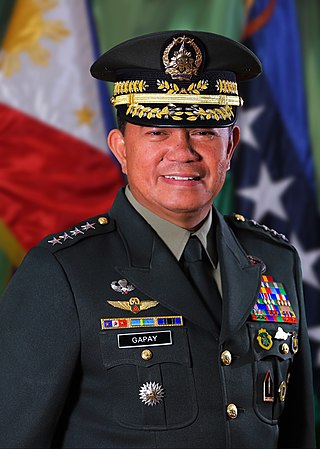
Davao Oriental, officially the Province of Davao Oriental, is a province in the Philippines located in the Davao Region in Mindanao. Its capital is the city of Mati, and it borders the province of Davao de Oro to the west, and Agusan del Sur and Surigao del Sur to the north. The province is the traditional homeland of the Mandaya and Kalagan/Kaagan.

Davao de Oro, officially the Province of Davao de Oro, is a province in the Philippines located in the Davao Region in Mindanao. Its capital is Nabunturan. It used to be part of the province of Davao del Norte until it was made a separate province in 1998.

Mawab, officially the Municipality of Mawab, is a 3rd class municipality in the province of Davao de Oro, Philippines. According to the 2020 census, it has a population of 39,631 people.

The Lumad are a group of Austronesian indigenous people in the southern Philippines. It is a Cebuano term meaning "native" or "indigenous". The term is short for Katawhang Lumad, the autonym officially adopted by the delegates of the Lumad Mindanao Peoples Federation (LMPF) founding assembly on 26 June 1986 at the Guadalupe Formation Center, Balindog, Kidapawan, Cotabato, Philippines. Usage of the term was accepted in Philippine jurisprudence when President Corazon Aquino signed into law Republic Act 6734, where the word was used in Art. XIII sec. 8(2) to distinguish Lumad ethnic communities from the islands of Mindanao.

The Philippine Army (PA) is the main, oldest and largest branch of the Armed Forces of the Philippines (AFP), responsible for ground warfare and as of 2021 had an estimated strength of 101,000 soldiers backed by 100,000 ready reserves. The service branch was established on December 21, 1935, as the Philippine Commonwealth Army. The Philippine Army has engaged in many conflicts including the ongoing Communist rebellion in the Philippines, the Moro conflict and, alongside other national military forces, in conflicts of international scope.

The Fourteenth Area Army was a field army of the Imperial Japanese Army (IJA) during World War II. It was originally the 14th Army, formed on November 6, 1941 for the upcoming invasion of the Philippines. It was reorganized in the Philippines on July 28, 1944, when Allied landings were considered imminent. The Fourteenth Area Army was formed by reinforcing and renaming the Japanese Fourteenth Army.

The 2nd Infantry Division, Philippine Army nicknamed Jungle Fighter, is the Philippine Army's primary infantry unit specializing in jungle warfare.

The 5th Infantry Division, Philippine Army, known officially as the Star Division, is the Philippine Army's primary infantry unit in Northern Luzon, and specializes in anti-guerrilla warfare.

The 6th Infantry Division is an infantry division of the Philippine Army. Popularly known as the Kampilan Division, the 6th Infantry Division is one of the Philippine Army's infantry units in Central Mindanao.

The 7th Infantry Division, Philippine Army, known officially as the Kaugnáy Division, is the Philippine Army's primary infantry unit specializing in rapid deployment.

Alexander Badong Yano is a retired Philippine Army general who served as the 38th Chief of Staff of the Armed Forces of the Philippines, the highest position in the AFP hierarchy. His Vice Chief of Staff was Lt. Gen. Cardozo M. Luna and his Deputy Chief of Staff was Lt. Gen. Rodrigo F. Maclang. Alexander Yano also served as the commander of the Philippine Army and Southern Luzon Command. He is also the first general born from Mindanao

The 10th Infantry Division, Philippine Army, also called the Agila Division, is one of the Philippine Army's infantry units in Mindanao.

The 8th Infantry Division, Philippine Army, known officially as the Storm Trooper Division, is one of the Philippine Army's Infantry units in the Visayas and under the AFP Central Command, combating local communist insurgent units, and terrorists.

The 3rd Infantry Division, also known as the Spearhead Division, is a unit of the Philippine Army, based at Camp Gen Macario Peralta Jr in Jamindan, Capiz, Philippines.

The 101st Infantry Division was one the reserve divisions of the Philippine Army under the United States Army Forces in the Far East (USAFFE).

Benjamin Rasgo Madrigal Jr. is a retired Philippine Army general serving as the Administrator of the Philippine Coconut Authority under the Duterte administration since January 2020. He previously served as the Chief of Staff of the Armed Forces of the Philippines from December 2018 to September 2019. He is a graduate of the Philippine Military Academy "Sandiwa" Class of 1985, along with his predecessor Gen. Carlito Galvez Jr.

The 11th Infantry Division, Philippine Army, also called the Alakdan Division, is one of the Philippine Army's infantry units in Mindanao. Currently still forming, the Division is expected to complete its equipment and manpower requirements by 2022. It is the youngest of all the infantry divisions of the Army and will have 4,500 troops when fully formed.

Macairog Sabiniano Alberto is a Filipino retired general and diplomat who served as the former Commanding General of the Philippine Army. He is a graduate of the Philippine Military Academy "Sinagtala" Class of 1986.

Eduardo "Ed" Drueco del Rosario is a Philippine Army veteran and government official who served as the first Secretary of Human Settlements and Urban Development of the Philippines under the Duterte administration, from January 2, 2020 to June 30, 2022. He previously served as Chairperson of the now-defunct Housing and Urban Development Coordinating Council which was abolished and replaced by the Department of Human Settlements and Urban Development created through Republic Act No. 11201 on February 14, 2019. Del Rosario served 37 years in the Armed Forces of the Philippines, retiring as a major general in 2012. His service included tours as commander of the AFP Southern Luzon Command and of the 2nd Infantry Division.

Gilbert Italia Gapay is a retired Philippine Army general who served as the 54th Chief of Staff of the Armed Forces of the Philippines. Prior to his appointment, he served as the 61st Chief of the Army and the commander of the Armor "Pambato" Division.




















